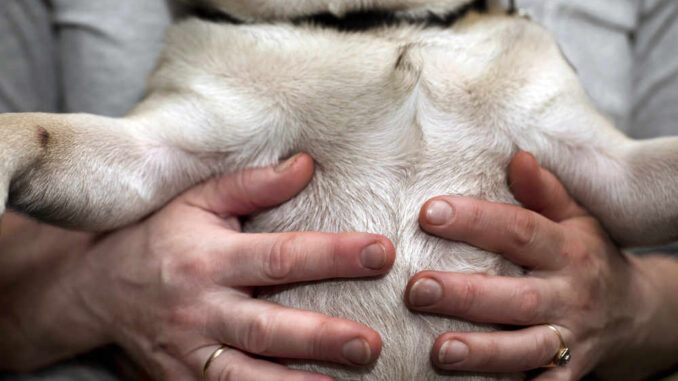
This article was updated on December 8th, 2022
You’re relaxing at home and your dog’s stomach starts chugging and gurgling. Should you be concerned?
There are various reasons for dog stomach gurgling. Most commonly, your pup’s tummy will rumble when it’s upset, but frequent gurgling or stomach sounds with other symptoms can indicate a more serious condition. Let’s figure out what’s going on with your dog, and what you can do to help.
Besides a Gurgling Stomach, is Your Dog Also Showing These Other Signs?
If your dog’s stomach is gurgling, but your dog is still acting and eating normally, we recommend reading our article (or keep reading):
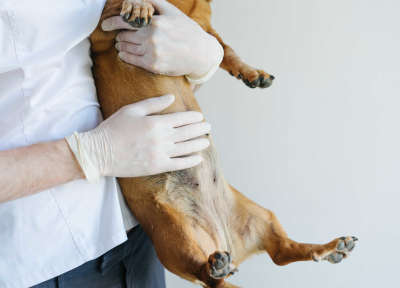
However, if your pup is also not eating (or experiencing vomiting and diarrhea), eating grass or having bad gas, we recommend reading one of the following:
- Gurgling stomach & dog NOT eating (or vomiting, having diarrhea)
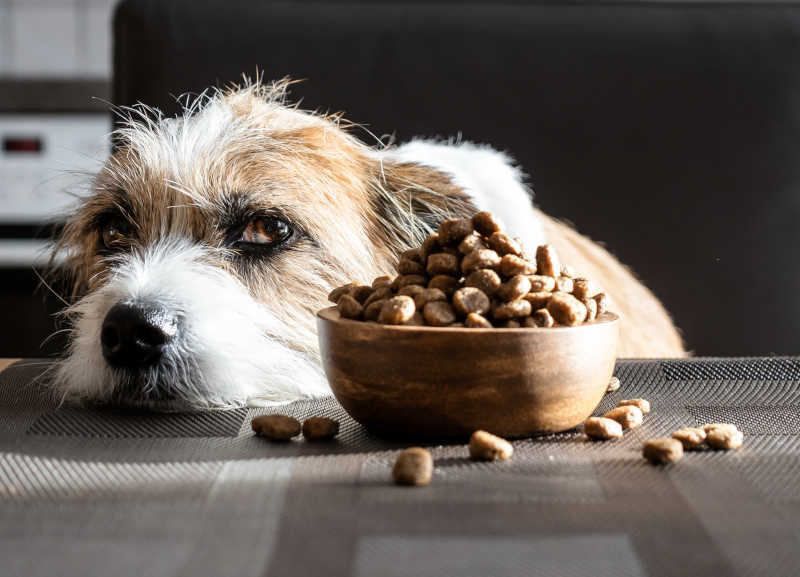
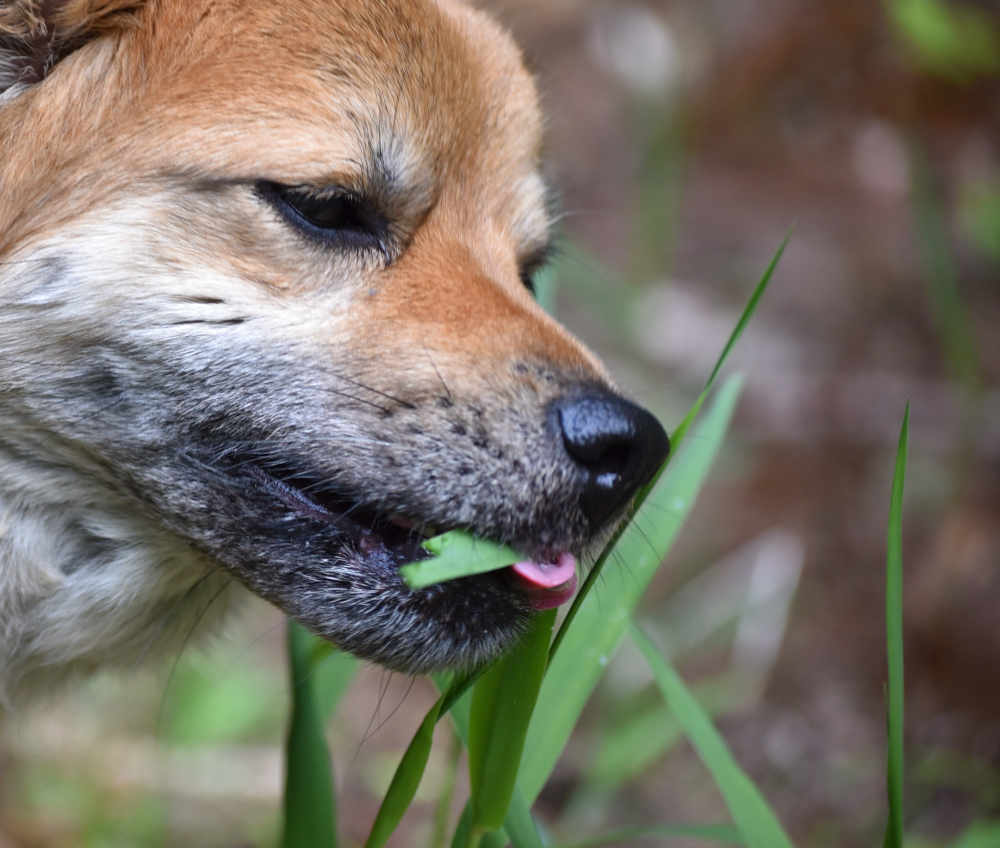
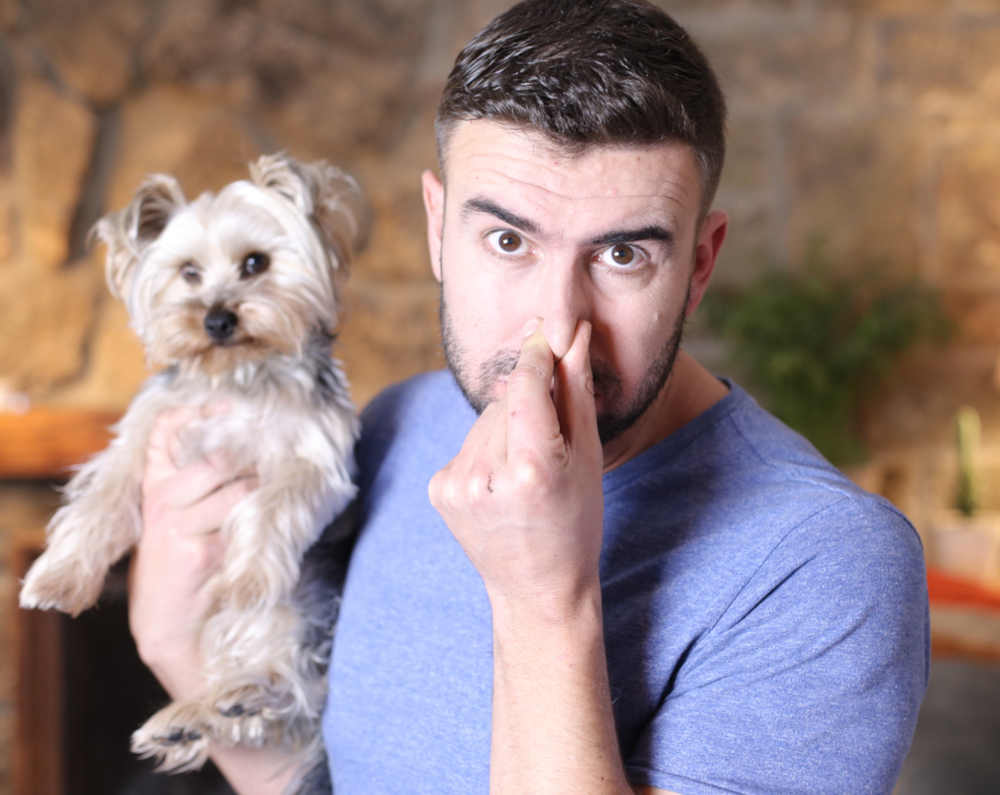
If your dog is eating normally & does not have unusually bad gas (just a loud stomach!), let’s find out why and whether you should do anything about it.
Why is my dog’s stomach making noises or gurgling?
Stomach gurgling, also called borborygmi, is normally due to excess gas or fluid in the digestive tract. Underlying causes of the rhythmic sounds include hunger, digestive upset, gulping air when eating, or a medical condition.
Is stomach gurgling normal?
Stomach gurgling is usually a normal part of digestion in dogs. When muscles in the stomach and intestines move digested food through the system, the passage of the liquid and solid contents creates gurgly sounds. However, if the sounds are louder than usual, it might indicate your pooch has an upset stomach.
When is stomach gurgling a concern?
Generally, stomach gurgling isn’t a concern unless your pup has other symptoms. If you notice your dog’s stomach sounds occur with any of the following signs, contact your veterinarian.
- Vomiting or diarrhea
- Loss of appetite
- Regurgitation of undigested food
- Drooling
- Bloated or swollen abdomen
- Decreased activity
- Acting uncomfortable
What are the most common reasons for stomach gurgling?
Stomach gurgling can occur for a variety of reasons. Fortunately, the most common causes are fairly harmless.
Upset stomach
Stomach gurgling is common with mild digestive upset. If your dog had a recent change in diet or tried a new treat, it could be enough to set off his system. This can make your furbaby feel uncomfortable, so he may not show much interest in food.
Gas buildup
Whether your pup gulps air with his meal or something he ate triggers gas formation during digestion, gas buildup in the digestive tract will create extra gurgling sounds. Naturally, the extra gas can also cause discomfort and eventually flatulence.
Empty stomach
Like us, our dogs’ stomachs make growling noises when they’re empty. That’s because all that’s left in the digestive tract is gas. If you notice your pup’s stomach rumbling in the morning or before dinnertime, he’s probably just hungry.
Stress
When dogs experience stress, their bodies release hormones to help them respond to the stimulus. As a side effect, the hormones also tend to trigger stomach gurgling. If your pup is stressed, he may show other signs like hiding or acting clingy.
What are the more serious causes of stomach gurgling?
While the most common causes for stomach gurgling aren’t serious for your pooch, there are other more serious reasons for the grumbling sounds.
Medical conditions
Certain medical conditions like inflammatory bowel disease, chronic pancreatitis, or liver disease can cause gurgling sounds. When your dog suffers a chronic or acute medical condition, the gut sounds will usually be accompanied by other signs like vomiting and diarrhea or a loss of appetite.
Illness or infection
Bacterial infections from microbes like salmonella or campylobacter can create gas in the gut and cause the stomach to gurgle. Viral infections may cause the gut to move food through the system more quickly, which also causes an increase in digestive sounds.
Parasites
Some gastrointestinal parasites can trigger increased gut sounds. As roundworms, hookworms, and tapeworms multiply in the intestines, they upset the digestive tract and cause gas buildup that makes gurgling noises. Dogs with parasites usually have an increased appetite and weight loss.
Blockage
Dogs can be vacuum cleaners, and sometimes they eat something they shouldn’t. When this happens, the indigestible materials can become lodged in the intestines and cause a blockage. Originally, the backup of food leads to gas buildup and gurgling sounds, but it can quickly become an emergency.
6 steps you can take at home to help your dog with stomach gurgling right now
If your dog’s stomach gurgling doesn’t appear to be something serious, there are some things you can do at home to ease your pup’s discomfort.
1. Switch to a bland, gut-soothing diet such as boiled rice and chicken. If your pup is vomiting, start with a 12-hour fast. Learn more with our article about easy and proven bland diets for dogs.
2. Allow your dog to eat a little grass to calm his stomach, but keep him away from other plants.
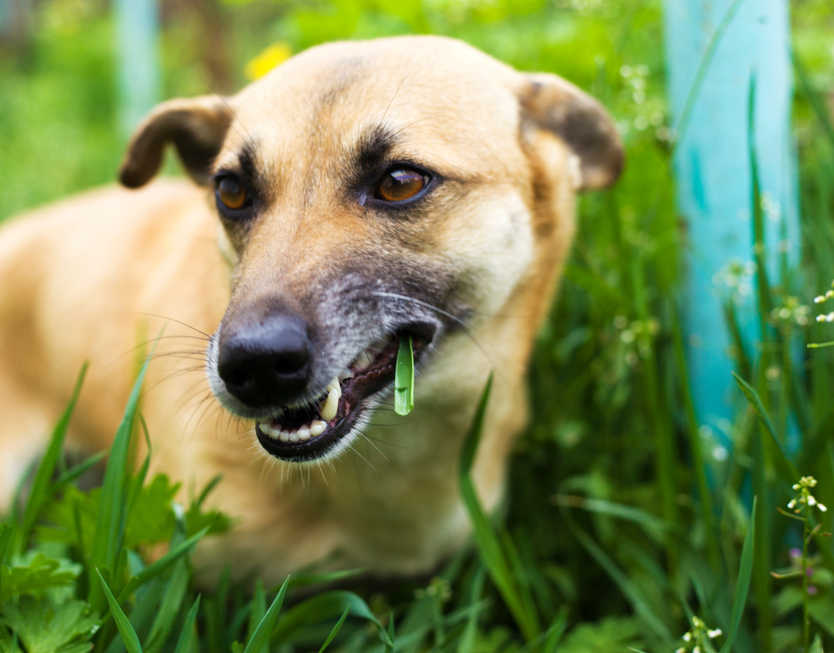
3. Supplement the diet with prebiotic fiber or probiotics. This can help foster a healthy gut flora to reduce the risk of indigestion.
4. Feed smaller, more frequent meals throughout the day.
5. Maintain a familiar routine to minimize stress.
6. Give them an appropriate level of exercise.
When should you call your veterinarian?
If you know your dog’s stomach is gurgling because of a serious condition like an intestinal blockage, take your dog to the vet. Other times that you should contact your veterinarian for an exam include:
- When your dog also has vomiting, diarrhea, or refuses to eat
- The gurgling quickly gets worse or louder
- The gurgling persists for more than 24 hours
- Your dog is uncomfortable or in pain
- You notice abdominal bloating
What will the vet do if I bring my dog in?
When you take your dog to the vet, he’ll start with a physical exam. The doctor will listen to your pup’s heart and lungs as well as his gut sound. Depending on the findings, he may run diagnostic tests such as:
- Bloodwork
- X-rays or ultrasound
- Food allergy panel
If your pup has vomiting or diarrhea, your vet may administer fluids to correct or prevent dehydration.
What is the treatment for a dog’s gurgling stomach?
Treatment for your dog’s gurgling stomach will depend on the underlying cause. Usually, it can be handled at home by temporarily withholding food if necessary and feeding a bland diet. If your dog has diarrhea, you may also be able to give him antidiarrheal medication or drugs to reduce gas production in the gut.
If your dog requires veterinary attention, the vet may
- administer subcutaneous or IV fluids to treat dehydration
- Give your dog anti-nausea medication
- Treat infections with antibiotics
- Give your dog anthelmintic drugs to remove parasites
- Surgically remove obstructions
How can I prevent a gurgling stomach from recurring in my dog?
Even though most cases of stomach gurgling are caused by normal digestive processes, there are some things you can try to prevent loud rumblings.
- Feed smaller, more frequent meals by dividing their diet portion into equal portions. That way your pup’s stomach won’t be empty as long between feedings. If you normally feed your pooch one cup twice a day, try feeding ⅔ cup three times a day.
- Use a slow-feed bowl if your pooch tends to gulp his meals. Dogs usually swallow air when they eat too fast, so slowing down their consumption can help decrease extra gas in the stomach.
- Prevent overeating by feeding a controlled portion of food and limiting snacks. Overfull stomachs have a harder time digesting food, and this can cause rumbling sounds.
- Provide ample fresh water to aid with healthy digestion.
- Maintain a routine to minimize stress and anxiety. Dogs thrive when they feel secure and know what to expect. As much as possible, keep a regular feeding schedule.
- Protect your pup’s health by feeding quality dog food, providing an appropriate amount of exercise, and scheduling regular check-ups with your vet.
Frequently asked questions
Do stomach noises cause your dog pain?
Normal stomach gurgling in dogs is not painful. However, if the sounds are caused by severe indigestion or an underlying medical condition, they can cause your pooch pain and discomfort.
Are some breeds more likely than others to experience stomach gurgles?
All dogs experience normal stomach gurgles as part of the digestive process. But some breeds are more susceptible to food sensitivities that can trigger indigestion and extra growling sounds. For example:
- Irish Setter
- West Highland White Terrier
- Great Dane
- Labrador Retriever
- German Shepherd
- Golden Retriever
- Boxer
What do you give a dog with an upset stomach?
If your dog has an upset stomach, you may want to start with a 12-24 hour fast. During that time, you can offer ice cubes to help settle indigestion and keep your pup hydrated. After the fast, some things you can offer your furbaby to relieve an upset stomach include:
- Ginger
- Bananas
- Pumpkin
- Yogurt with active probiotic cultures
- Probiotic supplements
- Medications to reduce stomach inflammation such as Immodium
Can worms cause stomach gurgling in dogs?
Worms can irritate the gut and cause increased gas production in the stomach or intestines. If the number of parasites is large enough, they can also cause a blockage. Both of these things will result in stomach gurgling.
Is Pepto Bismol a good option for my dog?
Pepto Bismol is usually safe to give to dogs with an upset stomach. Bear in mind that the medication contains salicylates which can cause gastric bleeding. If you choose to give your pooch Pepto Bismol for an upset stomach, don’t offer more than one or two doses. Consult with your veterinarian before treating your dog at home.
Related posts:






Disclaimer: This website's content is not a substitute for veterinary care. Always consult with your veterinarian for healthcare decisions. Read More.



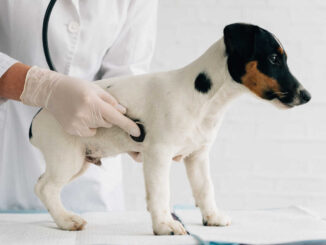


Be the first to comment